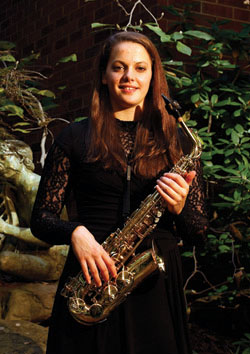Dec. 27, 2008

Subscribe to Commodore Nation Magazine / View Archived Issues
>>> Archive: Read More Features, Columns and Blogs
Austin Langley is used to challenges. She’s challenged daily in Vanderbilt’s Blair School of Music and as a member of Vanderbilt’s swimming team. However, none of those challenges stack up to a relatively unknown challenge that Langley has faced her entire life.
Since birth, Langley has had to deal with a severe low-tone hearing loss — something that makes her enrollment in the Blair School that much more remarkable. While most individuals with hearing loss struggle to hear high tones, such as whistling, the Vanderbilt sophomore is just the opposite.
“As you get older, most people naturally lose their high tones because they are unprotected,” Langley said. “I don’t have any low tones or conversational tones and the protective part is gone and they don’t really know why. It is really kind of uncommon to have it reversed like that.”
Langley’s hearing loss is hereditary on her father’s side of the family, with her father and grandfather also having low-tone hearing loss.
“Low-frequency hearing loss is typically seen in individuals with hereditary factors or middle ear pathologies,” said Meredith Moss, a clinical audiologist at Vanderbilt. “High-frequency hearing loss is much more common as it is seen in most individuals with age-related hearing loss and noise exposure.”
Although she’s had hearing loss since birth, it wasn’t discovered until first grade when Langley was failing all of her spelling tests.
It was then that her father taught her about another way to compensate for her loss of hearing.
“That is when my dad explained to me that if I watch what someone is saying, you might be able to figure out what letter they are saying,” Langley commented.
Since then, Langley has combined her ability to read lips with what she has been able to hear, to understand people.
“I hear every fifth or sixth syllable, so I pair that with what I see to understand what someone is saying,” Langley said. “It is variable depending on the situation, but in general that is the way it works.”
While the process would seem unnatural to most, it is completely natural for Langley and others in her family who have the same condition.
“You kind of just grow up reading lips when you need to,” Langley said. “My dad reads lips really well, and so does my grandfather. My grandfather almost needs no sound at all to understand what you are saying. My dad probably hears every seventh or eighth syllable and he is pairing that with what he is seeing to help him figure out what is being said.”
As natural as the process has become for Langley, there still are times when she has trouble understanding what others are saying. One example of this is in the classroom when a professor will talk softly or talk with his or her back to her. Even sitting in the front of the room, as she does in all of her classes, is useless in those situations.
Instances such as that have been new challenges for Langley since she arrived at Vanderbilt. Before college, Langley could always get by with just teaching herself, reading the book or asking classmates questions about what the teacher explained in class.
“In high school (my hearing loss) wasn’t really an issue in class,” Langley said. “I knew it was there, but it didn’t really affect anything. When I got to college, let me tell you, my professors don’t talk loud enough.”
The class where Langley was most affected was her calculus class the first semester of her freshman year.
“My professor’s shoes squeaked louder than his voice,” Langley said. “He’d always face the board, so I couldn’t lip read or do anything to help myself. I didn’t know what to do. As a result, I did not do well on the first two tests at all.”
Feeling helpless and realizing that the class was getting away from her, Langley turned to her academic adviser, Katie Berglund, for assistance. In turn, the athletic department was able to purchase an FM Listening System for Langley.
What the system does for Langley is magnify the sound of the teacher’s voice. For the system to work, Langley has the professor wear a device that looks like a lapel microphone, while she wears an earpiece. Since beginning to use the device, Langley has seen a tremendous spike in her performance in the classroom.
“After I got an FM System, the first test I did well on. It’s made a huge difference and has been very helpful.”
The improvement Langley had in the classroom with the FM Listening System may make it seem logical for Langley to wear a hearing aid, but it isn’t that easy according to her.
“Nowadays they can pick frequencies to be amplified on hearing aids, but they are still going to amplify the high tones, which is a problem for me,” Langley said. “They can turn them down. The only other problem is that, if I can hear the high tones, I don’t want to listen to it through a microphone because it has a different sound. If you turn the hearing aid completely off, it works as an earplug so it makes it worse. They are trying to find a way to overcome that situation and once they get that, then I might be interested in hearing aids.”
Moss believes that time may not be too far away.
“With the advent of digital, multi-channel, nonlinear hearing aids that offer greater flexibility of adjustment, it is possible for audiologists to fit this type of hearing loss more successfully,” Moss said.
Some people may let their hearing loss keep them from doing what they love, but not Langley. The best example of this may be her love of music, which is why she is enrolled in the Blair School as a saxophone player. Since the saxophone emits high tones, Langley is able to hear her own music fine. It is the music of other instruments, particularly those that play bass, that she is unable to hear.
“I guess in high school I always just played my instrument because it is in a range that I can hear,” Langley said. “I never really bothered with listening for other instruments and balance. I just kind of followed the director, and in private lessons I could hear my instruments.”
However, Langley quickly realized how much of a challenge it would be for her to excel in certain classes within her major because of her inability to hear bass.
“Last year, I had to hear and write out chords in my music theory class and that was the hardest thing for me because I couldn’t hear the bass unless I sat there and really focused,” Langley said. “I got speakers in my room with a subwoofer and I would put my feet on the subwoofer and turn up the bass as loud as it could go so I could feel it. That’s how I’d get my homework done. I couldn’t do it with regular headphones because with regular headphones, I couldn’t hear the bass at all.”
Although swimming isn’t necessarily a sport where you would think communication would be key, there are definitely times that present challenges for Langley, who specializes in the backstroke and 200 IM.
“Yes, it is a challenge,” Langley said. “Sometimes I can’t hear the set, and I get really frustrated because I didn’t hear the set and you have 30 seconds before you have to go. Especially if I’m going first that day and I don’t know what’s going on, it is really bad and I get really frustrated.”
It is obvious that Langley’s hearing loss hasn’t stopped her from achieving her goals, and she doesn’t plan on letting it slow her down anytime soon.
“It is very impressive for Austin to balance swimming and the Blair School,” swimming Coach Jeremy Organ said. “There are not enough hours in the day for Austin to get everything done. Her time management skills are put to the test each and every day. I think that music and swimming are very similar in that they both require practicing perfection every day, and that daily practice all leads up to a concert or a competition where your success is gauged by your performance.”
Langley’s ability to balance so many things at once, while overcoming her hearing loss, has led to her teammates respecting Langley even more.
“I think that everyone on the team respects Austin that much more because of all she does and has to deal with on a daily basis,” Organ said.
Even though she still is just a sophomore, Langley already has more than just the next two years of her life mapped out. This past summer, Langley found her true calling when she was in Norway with 4-H. During that time, she worked at a dairy farm.
“I’ve always really enjoyed being around animals, and this summer I decided that I really want to work around animals for my career,” Langley said. “I decided that I wanted to be a veterinarian and that I’m going to pursue the pre-vet track here. It’s going to be kind of difficult though because I’m a little behind, and I haven’t had science since high school.”
Langley’s interest in pursuing a career as a veterinarian also led to her question whether she should return to Vanderbilt before the start of this year. After all, the university does not offer the necessary classes to directly enter vet school, and she would have a lot of catching up to do.
“I decided that I really shouldn’t leave Vanderbilt because there was so much here for me between swimming and music,” Langley said.
Because she lacks the classes that would be necessary for her to get directly into vet school following graduation, Langley already has her eyes set on attending graduate school before “hopefully” returning to North Carolina to attend vet school at N.C. State.
The journey to become a vet may look long and winding for most students, but for someone like Langley, it would be hard to believe she would want it to be any other way.


